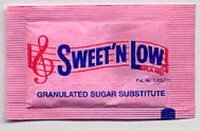Ben Eisenstadt is “part of that special breed of Americans—orphans, mongrels, mutts—responsible for no one but himself.” Growing up in turn-of-the-century Brooklyn, eight-year-old Ben works in his uncle’s tea bag factory from sunrise to sunset. This tough kid, with slouch-brimmed hat and chewed toothpick, eventually becomes the inventor of Sweet ‘N Low.
While working, Ben attends school and eventually becomes a lawyer. He attracts beautiful wife, Betty, ready to ride on the coat tails of his future success. Unfortunately, the Great Depression hits and Ben faces work as kitchen help in Betty’s family business. He enjoys local fame as the only busboy/lawyer in New York.
It’s in one of these shabby family diners where the idea to package sugar starts. Betty complains about the mess involved in sugar dispensers and bowls. The dispensers clog easily and the bowls are unsanitary because of the shared spoon usage. Ben asks, “What if the sugar was packaged separately, in little pouches?”
He purchases one of his uncle’s old tea bag machines and sets it up for sugar. We could stop here, with Ben’s success; unfortunately, Ben did not patent his machine. Hoping for a contract, he invites the leaders of Domino’s sugar to view his contraption. After two weeks of waiting, Ben finally discovers they are packing sugar, but with their own machines.
Sweet and Low by Rich Cohen mixes memoir, humor, and  history as the story of his family’s business unfolds. This unauthorized true story, as seen through the eyes of a disinherited family member, reminds me of the cast in Neil Simon's play, "Lost in Yonkers": a Jewish family complete with one neurotic mother, miserly father, golden-boy son, recluse daughter, and a daughter with moxie, or in this case, Cohen’s mother.
history as the story of his family’s business unfolds. This unauthorized true story, as seen through the eyes of a disinherited family member, reminds me of the cast in Neil Simon's play, "Lost in Yonkers": a Jewish family complete with one neurotic mother, miserly father, golden-boy son, recluse daughter, and a daughter with moxie, or in this case, Cohen’s mother.
The author tells this incredible story in three parts. The first part consists of a brief history of Brooklyn and Sweet ‘N Low’s humble beginnings. The second part relates how mobsters infiltrate the factory and launder millions of dollars through phony invoices. The last part concentrates on the disinheritance of the Cohen family and Sweet ‘N Low’s market loss.
Cohen, contributing editor of Rolling Stones Magazine, has waited all his life to tell his family’s story. Just like the product that made his grandfather rich, the story is sweet with a little bitter aftertaste.
My Mission...Not Impossible...Make Mississippi Read!
Wednesday, May 24, 2006
Sweet and Low (copy)
Subscribe to:
Post Comments (Atom)



1 comment:
I also heard a lively interview with the author on public radio. I am looking forward to reading the book. Thanks for the review.
Post a Comment